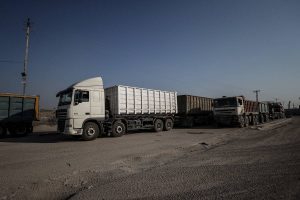
After days of closure and exportation halts, on Friday, Israeli occupation authorities reopened the Kerem Shalom crossing to exports from the besieged Gaza Strip. The prevention of exit of all goods from the coastal enclave via the fully Israeli-controlled Kerem Shalom crossing, the sole point of commercial import and export between Gaza and the rest of the world, caused serious repercussions for Gaza’s civilian population and economic sector.
Home to around 2.3 million Palestinians, Gaza is plagued by the devastating Israeli land, air and ground siege, pushing collapse across many sectors and causing soaring poverty and unemployment rates. Experts cautioned the recent decision to halt exports from the Gaza Strip as potentially catastrophic for the coastal enclave.
A report by the Palestinian Federation of Industries stated that the direct losses to the industrial sectors due to the decision to stop exports amounted to about $4,760,000. The five main sectors directly affected by the decision to halt exports are the clothing and textile sectors and the wood, plastic, food, engineering and metal industries. Approximately 147 factories, collectively employing 6,895 workers, were impacted by the closures, experiencing delays and work shutdowns in addition to lost revenue.
OPINION: An extremely dangerous future awaits the West Bank
According to statements by the Ministry of Agriculture in Gaza, the losses resulting from the cessation of agricultural exports are estimated at one million shekels.
In the wake of seventeen years of the occupation-imposed restriction on Gaza Strip exports, Gaza industrial exports have not exceeded a ten per cent margin of what they were before the imposition of the 2007 siege, according to the Human Rights Centre.
Head of the Fishermen’s Syndicate Nizar Ayyash conveyed in press statements: “The Gaza Strip exports about 80 tonnes of fish per month, and stopping exports causes losses of up to about 50 per cent for Palestinian fishermen.” He explained that continuing to implement this decision would lead to: “A complete cessation of the fishing sector, as the fisherman will not be able to manage the operational expenses necessary to operate boats at sea, in light of the high costs.”
Ayyash pointed out that Palestinian fishermen’s financial return from marketing fish in the local Gaza Strip markets is insufficient to cover these costs. Gazan fishermen often rely on selling their fish at high prices in the export market compared to Gaza market prices.
READ: Palestine refugee camps witness to historic resistance, Israel aggression
The statement also pointed out that closing the crossing is an unjust measure considered collective punishment by which the occupation inflicts unnecessary suffering on more than two million people in the Gaza Strip, aggravating the already difficult living conditions under Israeli siege and causing a real humanitarian catastrophe. Ayyash further noted that the policy of collective punishment is prohibited according to Article 33 of the Geneva Convention.
The Israeli authorities informed the Presidential Committee on Coordination of Goods in the Gaza Strip of the Israeli government’s decision to halt all exports from Gaza via Kerem Shalom, starting 5 September, 2023, and continuing indefinitely. This decision comes in the wake of claims that Israeli investigators had allegedly discovered a small amount of explosive material inside a shipment of clothing transported from Gaza to the West Bank. This allegation has been castigated by political analysts and experts as another spurious Israeli justification enabling further collective punishment of the besieged Gaza Strip.
According to political analyst Dr Wael Almana’mah: “The oppressive measures taken by the Israeli occupation authorities are fully matched by the mendacity of its spokespeople. The Israeli occupation’s claim that explosive materials were to be smuggled from Gaza to the West Bank is a protracted attempt to leverage more pressure on the Gaza strip.”
Dr Almana’mah continued: “The material that was allegedly discovered is not found in Gaza. On the contrary, Gaza needs support from others to support in order to access such materials.”
OPINION: The UN’s plan to cease food aid in Gaza will cause thousands of job losses, increase poverty
The decision comes soon after the threatened assassination of senior resistance commanders in Gaza, based on an Israeli claim that the latest wave of resistance attacks against Israeli occupation forces in the occupied West Bank are incited by Gazan resistance parties. Dr Almana’mah believes that the economic crisis was created to pressure the resistance in Gaza to make concessions for the sake of the Israeli occupation.
Before the crippling Israeli siege on Gaza in 2007, some basic industrial sectors relied on export and marketing outside the coastal enclave, such as the textile, clothing and furniture industries and the agricultural and food manufacturing sectors. The occupation authorities halted all exports out of Gaza from 2007 until the end of 2014. In November 2014, following the Israeli offensive between July and August of the same year, commercial transport and export of agricultural products, furniture and clothing were resumed from the Gaza Strip to the West Bank.
This is not the first time Israel has decided to stop all movement of goods through the Kerem Shalom crossing in response to isolated incidents. In an act of non-compliance with international law, the Israeli occupation regime leverages its total control at the crossing of the impoverished Gaza to strong-arm Palestinians into submission and subdue the Palestinian resistance factions.
The move is condemned by human rights organisations as they call to stop the oppressive and discriminatory practices and the dangerous game played by the apartheid state.
